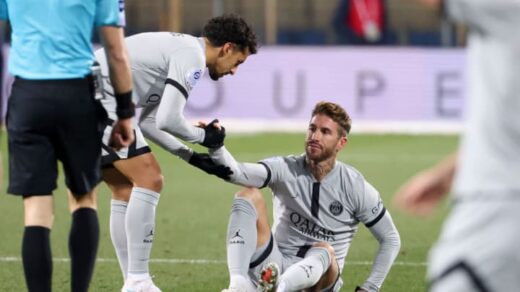AL DAAYEN, Qatar — When Luka Modric made his international debut for Croatia in March 2006, at the age of 21, Argentina and a 19-year-old Lionel Messi were his opponents. That day, Modric won the friendly encounter 3-2, Messi scored his first international goal and it was the beginning of a career-long rivalry for club (Real Madrid vs. Barcelona) and country.
Little did Modric know that 16 years later, his World Cup career (and possibly his international career) would end at the hands of the same player and opposition with a 3-0 semifinal defeat. Even if he plays in the third-place playoff on Saturday against either France or Morocco, his last big moment on football’s grandest stage — having been a finalist in 2018 against France and semifinalist in Qatar — was really his 161st cap on Tuesday night in the Lusail Iconic Stadium.
Despite a solid start against Argentina, including a beautiful nutmeg on Alexis Mac Allister after 30 minutes, it became too difficult for Croatia to recover once Messi and Julian Alvaraz scored in a five-minute spell before half-time. It was not the right game for Modric to have an off day but, at 37, he can’t always keep producing magic.
– World Cup 2022: News and features | Schedule | Bracket
To qualify for another final, Croatia needed him to be at his absolute best: to control everything like he usually does, to be precise on set pieces, to create chances and bring fluidity to the game. But it was not the case and his supporting cast were below par too.
Argentina and their four central midfielders made Modric look average at times. Constantly under pressure while on the ball, he made a host of wrong decisions after Argentina’s first goal and failed to make the impact on the game many expected.
With passing accuracy of 86%, he completed 67 passes (despite 93 touches), with only five coming in Argentina’s final third in 81 minutes on the pitch — his lowest figures at this World Cup. By comparison, against Brazil in the quarterfinal, Modric had 22 passes in the last third and even if he played 40 minutes more against Neymar & Co., his influence on the game against Argentina was not comparable.
– Stream on ESPN+: LaLiga, Bundesliga, more (U.S.)
Croatia manager Zlatko Dalic wants Modric to play for the national team until Euro 2024 in Germany, but the midfielder’s body language at the end of the game didn’t suggest as much. There was a long-standing ovation from the crowd when he came off with 10 minutes to go, but his long goodbye — waving towards the Croatia fans and hugging every single one of his teammates — felt like this was his last big game for his country.
The 2018 Ballon d’Or winner could yet be persuaded to prolong his international career to lead the team in 18 months’ time, with Dalic saying afterwards: “We have had a great team and this generation will finish off their career at Euro 2024.” But although he is considering what to do, with Croatia in the Nations League finals next summer as well, it might not be the best idea.
Whatever happens, it has been an amazing ride. Modric led Croatia’s golden generation to new heights, equalling (perhaps even surpassing) the Davor Suker/Aljosa Asanovic-era side who made the World Cup semifinals in 1998 to make the fans proud of their team again. And for a country of just 3.9 million people, that is an extraordinary feat.
Modric was not alone, of course, and this World Cup could also be the end of the road for Ivan Perisic (34 in February), Dejan Lovren (33) and Domagoj Vida (33.) But Marcelo Brozovic (30), Andrej Kramaric (31) and Mateo Kovacic (28) will continue and there is hope for the future with a new generation coming through including Lovro Majer (24), Josko Gvardiol (20) and Luka Sucic (20.)
With little resources and against all odds, this Croatia side managed to scale incredible heights without ever reaching the summit. With their dream of a second successive World Cup final shattered by Messi and Argentina, it could take a while to get back to the top again without their leading light.
Modric’s international career started against Argentina and it could have finished against them as well. The midfielder played with so much flair that he felt almost Argentine at times, like a Juan Roman Riquelme or Ariel Ortega. He graced the World Cup with his skill, vision and distribution and his talent will be sorely missed in 2026.



